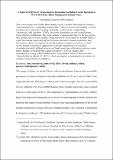Files in this item
A postcritical poetics? Transtemporal encounters in defunct Soviet barracks in works by Ulrike Almut Sandig and Clemens Meyer
Item metadata
| dc.contributor.author | Smith, Thomas Allan | |
| dc.date.accessioned | 2020-04-11T23:32:18Z | |
| dc.date.available | 2020-04-11T23:32:18Z | |
| dc.date.issued | 2018 | |
| dc.identifier | 255272736 | |
| dc.identifier | 98640a77-8f50-4cf7-8b4d-ec1ba1edd257 | |
| dc.identifier | 85055492782 | |
| dc.identifier | 000447409600006 | |
| dc.identifier.citation | Smith , T A 2018 , ' A postcritical poetics? Transtemporal encounters in defunct Soviet barracks in works by Ulrike Almut Sandig and Clemens Meyer ' , Oxford German Studies , vol. 47 , no. 3 , pp. 313-328 . https://doi.org/10.1080/00787191.2018.1503470 | en |
| dc.identifier.issn | 0078-7191 | |
| dc.identifier.other | ORCID: /0000-0001-5084-8729/work/60427744 | |
| dc.identifier.uri | https://hdl.handle.net/10023/19782 | |
| dc.description.abstract | This article argues that Ulrike Almut Sandig’s poetry models what might be termed a ‘postcritical poetics’, expanding on Rita Felski’s idea of ‘postcritical reading’ to reveal strategies for a postcritical writing. In Sandig’s earlier poems, particularly ‘russenwald’ and ‘gardinen’ (2007), she evokes encounters on and around former Soviet military installations. The poems assume a postcritical stance to the past and in turn prompt a postcritical reading. Using theories by Felski and José Esteban Muñoz, I argue that Sandig stages fleeting interpersonal encounters based on openness and fascination, which work against the backdrop of past and present violence in both works. Sandig’s encounters suggest how everyday interactions can articulate dissatisfaction with a difficult present and look towards possible ethical relations in the future. Sandig’s writing further suggests productive ways of reading other contemporary writing, which I demonstrate using Clemens Meyer’s short narrative ‘Glasscherben im Objekt 95’ (2017), which also depicts a transtemporal encounter on a defunct Soviet military installation. | |
| dc.format.extent | 460211 | |
| dc.language.iso | eng | |
| dc.relation.ispartof | Oxford German Studies | en |
| dc.subject | Time | en |
| dc.subject | Encounter | en |
| dc.subject | Postcritical | en |
| dc.subject | Felski, Rita | en |
| dc.subject | GDR | en |
| dc.subject | Soviet | en |
| dc.subject | Military | en |
| dc.subject | Ethics | en |
| dc.subject | Poetics | en |
| dc.subject | Contemporary | en |
| dc.subject | Future | en |
| dc.subject | Munoz, Jose Esteban | en |
| dc.subject | Sandig, Ulrike Almut | en |
| dc.subject | Meyer, Clemens | en |
| dc.subject | PN Literature (General) | en |
| dc.subject | T-NDAS | en |
| dc.subject | BDC | en |
| dc.subject | R2C | en |
| dc.subject | SDG 16 - Peace, Justice and Strong Institutions | en |
| dc.subject.lcc | PN | en |
| dc.title | A postcritical poetics? Transtemporal encounters in defunct Soviet barracks in works by Ulrike Almut Sandig and Clemens Meyer | en |
| dc.type | Journal article | en |
| dc.contributor.institution | University of St Andrews. German | en |
| dc.identifier.doi | 10.1080/00787191.2018.1503470 | |
| dc.description.status | Peer reviewed | en |
| dc.date.embargoedUntil | 2020-04-12 |
This item appears in the following Collection(s)
Items in the St Andrews Research Repository are protected by copyright, with all rights reserved, unless otherwise indicated.

